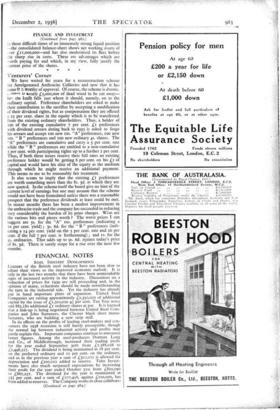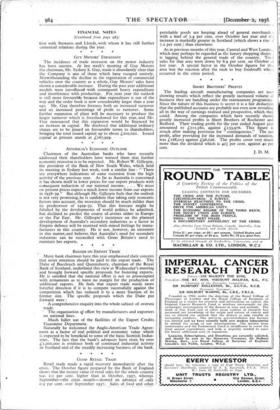FINANCIAL NOTES STEEL INDUSTRY DEVELOPMENTS LEADERS of the British steel
industry have not been slow to adjust their views to the improved economic outlook. It is only in the last two months that there have been unmistakable signs of increased activity in the industry. Discussions on a reduction of prices for 1939 are still proceeding and, in the opinion, of many, reductions should be made notwithstanding the turn in the industrial tide. Yet the industry has already put in hand important plans of expansion. United Steel Companies are raising approximately £2,350,000 of additional capital by the issue of £1,500,030 41 per cent. Ten Year notes and 882,i8o additional £r ordinary shares at par. It is learned that a link-up is being negotiated between United Steel Com- panies and John Summers, the Chester black sheet manu- facturers, who are building a new strip mill. In its effects on the profits of leading steel-makers and con- sumers the 1938 recession is still barely perceptible, though the normal lag between industrial activity and profits may partly explain this. Important companies continue to announce better figures. Among the steel-producers Dorman Long and Co., of Middlesbrough, increased their trading profit for the year ended September 3oth from £1,388,026 to £1,498,517. The dividend is being maintained at 18 per cent. on the preferred ordinary and ro per cent. on the ordinary, and as in the previous year a sum of £303,030 is allowed for depreciation and £zoo,000 added to reserve. Tube Invest- ments have also much surpassed expectations by increasing their profit for the year ended October 31st from £825,090 to £867,257. The dividend for the year is maintained at 231 per cent. and a sum of £177,458, against £roo,000, has been added to reserves. The Company works in close collabora- (Continued on page 984.) FINANCIAL NOTES (Continued from page 983)
tion with Stewarts and Lloyds, with whom it has still further cemented relations- during the year.
* * * *
GUY MOTORS' EXPANSION
The incidence of trade recession on the motor industry has been uneven. At last week's meeting of Guy Motors the chairman, Mr. Sydney S. Guy, made it abundantly clear that the Company is one of thOse which have escaped entirely. Notwithstanding the decline in the registration of commercial vehicles over the country as a whole, Guy MotOrs' sales have shown a considerable increase. During the past year additional models were introthiced'iwith consequent heavy expenditure and interference with production. „For...next year the outlook is still more favourable because. that .expenditure is out of the way and the order book is now considerably larger than a year ago. Mr. Guy therefore foresees both an increased turnover and an increased percentage of profit to turnover. Some further expansion of plant will. be necessary to produce the larger turnover which is foreshadowed for this year, and Mr. Guy announced that this expansion would be financed by an increase in capital. He disclosed that -additional Ordinary shares are to be Issued on favourable terms to shareholders, bringing bringing the total issued capital up to about £200,000. Issued capital at -present stands at £167,929. -
* * *
r . AUSTRALIA'S ECONOMIC OUTLOOK
Chairmen of the Australian 'banks who have recently addressed their shareholders have warned them that further economic recession is to be expected. Mr. Robert W. Gillespie, the president of the Bank of New South Wales, which held- its meeting in Sydney last week, took a similar line : " There are everywhere indications of some recession from the high activity-of the previous year. As far as Australia is concerned it has:shown itself in lower prices for our export products with consequent reduction of- our national income. . . . We must on present tirices 'expect a nanch lowerincome from our exports in 1'938-39." But although Mr. Gillespie feels that the outlook is not very promising, he is confident that taking only economic factors into account, the recession should be much milder than - its predecessor of 1929-32. That this forecast might be falsified by the developments of world politics he admitted, . but flPclined to -predict the course of eventseither-in -Europe or the. Far East. Mr. Gillespie's insistence on the planned development of Australia's secondary industries as a factor in Empire defence will be received with mixed feelings by manu- facturers in this country. He is- not, however an extremist in this matter, and_ believes that Australia's need-for secondatY- . industries can be reconciled with Great ;Britain's need to maintain her exports.
* * * BANKER ON EXPORT TRADE •
Many bank chairmen have this year emphasised their concern that more attention should be paid to the export trade. The Duke of Buccleuch and Queensberry, chairman of the Royal Bank of Scotland, underlined this view at Wednesday's meeting and brought forward specific proposals for fostering exports. He is satisfied that the national effort is not so preoccupied with armaments as to leave no margin for the production of
exports. He feels that export trade needs more forceful direction if it is to compete successfully against the competition which has reduced it to a mere fraction of its former size. The specific proposals which the Duke put forward were - A comprehensive enquiry into the whole subject of oversea trade.
The organisation ttf effort by, manufacturers and exporters on national lines.
Much fuller use of the facilities of the Export Credits , Guarantee Department.
Naturally he welcomed the Anglo-American Trade Agree- ment as a factor of real political and economic value which is expected to be beneficial to some of the basic Scottish Indus- tries. The fact that the bank's advances have risen by over ‘1,000 Goo is evidence both of continued industrial activity in Scotland and of the steadily increasing business of the bank.
* •* * *
GOOD RETAIL TRADE
Retail trade made a rapid recovery immediately after the crisis. The October figure prepared by the Bank of England shows that the money value of retail sales for the whole country was 2.0 per cent. higher than in October, 1937t whereas September—the crisis . mouth—showed an advance of -only 0.9 per cent. over September 1937. Sales of food and other perishable goods are keeping ahead of general merchandi, with a lead of 3.4 per cent, over October last year and increase is markedly greater in Scotland (which shows a rise . 7.2 per cent.) than elsewhere.
As in previous months of this year, Central and West Londol., which may perhaps be regarded as the luxury shopping distric , is lagging behind the general trade of the country. Total sales .for that area were down by .8.9 per cent. on October of last year. A special factor in the October figures for this area was the reaction after the rush to buy foodstuffs whic:i occurred in the crisis period.
* * * *
SHORT BROTHERS' PROFITS
The leading aircraft manufacturing companies are now showing results which reflect the greatly increased volume of business they are handling under the rearmament programme. Since the nature of this business is secret it is a fair deduction that the published accounts are probably'not even now revealing all in the way of earnings realised and prospective, which they could. Among the companies which have recently shown greatly increased profits is Short Brothers of Rochester and Bedford. Their trading profit for the.year ended August 31st amounted to 4211,580, against £133,976. This figure is struck after making provision for " contingencies:' The net profit, after providing for the increased demands of taxation, was £168,013 against £98,026. The profits cover very much more than the dividend which is 42f per cent. against 4o per cent.
J. D.' M.



























































 Previous page
Previous page